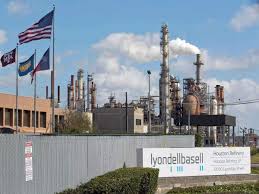LyondellBasell Industries, a chemical manufacturer, revealed its long-awaited decision to permanently close its 263,776 barrel-per-day (bpd) oil refinery in Houston in the first quarter of 2025 on Friday.
As motor fuel demand is predicted to peak this decade and then fall due to pressure from renewable fuels and electric vehicles, the scheduled closure is the most recent in a series of refinery closures in the United States.
On a call to discuss third-quarter results, Lyondell refining head Kim Foley informed analysts that one of the facility’s coker production train and crude distillation units (CDU) will go down in January.
Motor fuel production will cease in February when the second CDU-coker production train, which supplies the fluidic catalytic cracker (FCC) and ancillary units that produce gasoline, shuts down, according to Foley.
According to Lyondell, the refinery will operate at 90% capacity during the fourth quarter of this year.
The Houston refinery was originally scheduled to close in 2023, but Lyondell decided to prolong its existence because of the high fuel margins.
Valero Energy and Phillips 66, two competing U.S. refiners, announced last month that they will close one refinery in California and assess two others for potential closure in that state.
Laptops 1000By the end of 2025, Phillips 66’s refinery in Los Angeles, which produces 139,000 barrels per day, will stop producing.
“The refinery, if you think back historically, was originally designed to process in-state California crude production, and that has declined by about 75%,” Mark Lashier, the company’s CEO, stated.
According to Valero CEO Lane Riggs, “all options are on the table” for the company’s refineries in Wilmington, California, which produce 91,300 barrels per day, and Benicia, California, which produce 145,000 barrels per day.
In a complaint with the U.S. Securities and Exchange Commission, Valero claimed that new California regulations requiring operators to keep emergency inventories would penalize them and render their refineries unprofitable.
Nine crude oil refineries with a combined capacity of 1.2 million barrels per day were idled or converted to produce renewable fuels during the most recent round of refinery closures in the United States, which took place between 2017 and 2022.

















